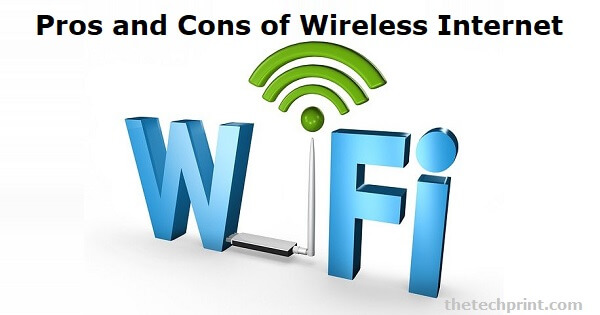People use wireless networks daily, both in their professional and personal lives. The use of mobile phones, tablets, laptops, and other wireless networking devices has become an everyday thing. Wireless network technology is efficient and cost-effective, which is why it is so popular worldwide. Every passing day brings forth another advantage for the mobile workforce. That's why businesses are turning to wireless internet more than ever before. But you should consider all of the pros and cons of wireless internet before deciding to use it in your company.
The following pros of wireless internet are evident why many businesses are shifting towards it.
The most significant benefit of wireless internet is that it allows employees to work from anywhere. With a laptop and an internet connection, they can do their job from home, a coffee shop, or even while traveling. This remote work option increases productivity as well as employee satisfaction.
The most important advantage is that a wireless network improves data communication, no matter where people are. If someone is in a meeting room or on the phone in another office or space, they can access data statistics or sales figures immediately without returning to their desk.
Making certain you can connect online at all times, regardless of where you are, is an excellent advantage of utilizing a wireless network.
Wireless network technology's superior level of coverage will assist your company in reaching more quickly and effectively.
The financial impact of any set-up or system will always be significant to a business. When choosing a wireless network installation, you should be able to find cost savings. This type of network may be easier and less expensive to install, especially in buildings not wanting cables installed or in historic structures with listed status.
There's a lot to be said for providing WiFi internet connectivity, and it might be that you offer new services or even create a coffee station on-site. If you have built-in wireless access in your office or commercial premises, you may be able to provide additional items or services.
Team members can primarily use this to unwind while being connected with the company, but it might also offer new revenue for your company.
When wires and cables are strewn about an office, individuals may trip or walk on them. You eliminate these elements when you switch to wireless technology, making your workplace a safer place, that’s one of the main pros of Wireless internet for a company.
Wires and cables may make your workplace unsightly, impacting employees' moods and thoughts. It should be easier to keep your office tidy when there are fewer wires and cables, which can help with productivity.
There are many cons of wireless internet which is the reason why companies still employ cable internet.
Wireless networks come with several challenges, including security. If a wireless network is not installed or maintained correctly, it can cause significant security risks. A wireless network does not require using physical connections such as cables.
They only need a wireless adapter, which allows hackers easy access to the network because they don't require passwords. Things may become more complicated if there is password protection for the network.
Because these networks have low bandwidth, they can't handle VTC or video teleconferencing. It's also limited in terms of expandability because there isn't a wireless spectrum available. If the network is not password protected, neighboring devices may steal bandwidth.
The speed of the wireless network is generally lower than that of wired networks. In a wireless network, file transfers and sharing are much slower. The connection's speed is also determined by the user's location on the network. The farther away from the network a person is, the worse their connection gets.
This is a severe problem for huge rooms or structures since the signal has to travel much farther.
Wireless networks are also susceptible to interference from other devices that operate on the same frequency. Microwaves, baby monitors, and even cordless phones can cause interference. If there is too much interference, it can cause the network to be unavailable or unstable.
The cost of installing and maintaining a wireless network can be expensive. The equipment required for a wireless network is more costly than for a wired network. In addition, wireless networks need more workforce to install and maintain.
Setting up a wireless network does not need much expertise with computers which is one of the known cons of wireless internet. Installing a wireless network may be difficult for individuals unfamiliar with the computer field. Hackers have little difficulty hacking those networks, which presents a significant security risk.

On the other hand, WiFi connections have significantly less bandwidth than wired internet. This is because data travels directly from one device to another when linked via an Ethernet connection. When a WiFi signal travels through the air from one location to another, there is a certain amount of signal loss anticipated.
Wireless networks allow numerous devices to share the same internet connection remotely and exchange data and resources. They also enable mobile devices with WiFi capabilities, such as laptops, tablets, and phones, to move freely throughout the network while maintaining a link to the internet and the network.
Even though wireless networks employ various encryption methods, they are still vulnerable to hacking. Because it is wireless, it has an increased risk of being hacked, especially public WiFi hotspots.
The reliability of wireless internet is quite good. Unlike satellite internet, it has low latency and does not suffer from bad weather conditions. That's why it's an excellent choice for rural telecommuters and enterprises and household internet service.